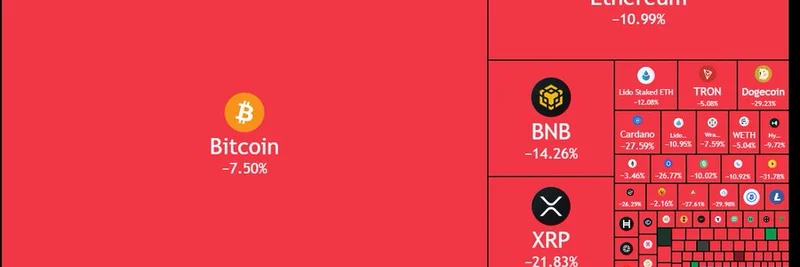The crypto world just witnessed what might be its most brutal shakeout ever. On October 10, 2025, a staggering $19 billion in positions got liquidated—dwarfing previous events like the FTX collapse or the COVID crash, which each saw about $1 billion wiped out. This thread from @FabianoSolana on X breaks it down step by step, highlighting how geopolitical tensions sparked a chain reaction in the markets.
If you're new to this, liquidations happen when leveraged trades—basically borrowing money to bet bigger on price moves—go south. Exchanges force-sell positions to cover losses, which can snowball into bigger drops.
The Spark: Suspicious Trading Ahead of the Storm
It all kicked off around 2:47 PM UTC on October 10. A fresh account on Hyperliquid, a decentralized exchange for perpetual futures, shorted Bitcoin (BTC) and Ethereum (ETH) with 12x leverage using 91 ETH. Shorting means betting on prices falling. Thirty minutes later, the market tanked, and this trader pocketed nearly $200 million. Coincidence or insider info? As the thread notes, we might never know, but it raises eyebrows about potential front-running in crypto.
Trump's Warning Ignites the Dip
By 3:30 PM UTC, former President Donald Trump dropped a hint on social media about China getting "very hostile" and teased "massive tariff news." Markets hate uncertainty, especially around trade wars. Crypto, being global and sensitive to economic vibes, dipped hard. BTC and ETH led the plunge, triggering initial stop-loss orders—automatic sells to limit losses.
Escalation: Full-Blown Tariff Announcement
At 7:00 PM UTC, Trump confirmed 100% tariffs on Chinese imports, fanning fears of a renewed US-China trade war. This was the match to the powder keg. As prices slid, leveraged longs (bets on rising prices) got hammered. Exchanges like Binance started auto-liquidating positions en masse. The cascade effect? More selling pressure, deeper drops.
The Liquidation Tsunami Hits
By 8:30 PM UTC, nearly every leveraged position without a safety net was toast. Longs got flushed first, but then early shorts faced squeezes as market makers—big players who provide liquidity—cleared the board. This isn't uncommon in volatile markets; it's like a reset button, but it hurts retail traders the most.
Meme Tokens and Alts Take a Beating
Around 9:30 PM UTC, tokens like JUP, SUI, and PUMP cratered—some nearly to zero on Binance due to depegs in stablecoins like USDE and wrapped assets like BNSOL and WBETH. Depegging means these "stable" coins lost their 1:1 tie to the dollar, amplifying chaos. The thread suggests market maker manipulation amid exhausted liquidity, turning the perp markets into a ghost town temporarily.
A Silver Lining for Solana
Amid the wreckage, one bright spot: Solana handled the surge like a champ. At 9:50 PM UTC, while other exchanges and chains buckled under traffic, Solana saw no congestion despite a sixfold spike in activity. This underscores its scalability, a key edge in DeFi (decentralized finance), where speed matters.
The Aftermath and Fragile Recovery
By October 11 at 10:00 PM UTC, Trump clarified he hadn't canceled a meeting with China's Xi yet, offering some relief. Markets bounced a bit, but the damage was done. Sentiment's still shaky, with warnings from firms like UBS about more selling come Monday.
The thread wraps with a TL;DR: A leverage purge fueled by tariff threats, plus some sketchy backstage moves. Is the worst behind us? That's the big question floating in crypto circles now.
For meme token enthusiasts, this event highlights the wild risks in leveraged trading. If you're diving into DeFi or memecoins, always use stop-losses and don't over-leverage. Stay tuned to Meme Insider for more breakdowns on how these events shape the blockchain landscape. What are your thoughts on this crash—insider trading or just bad luck?


